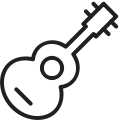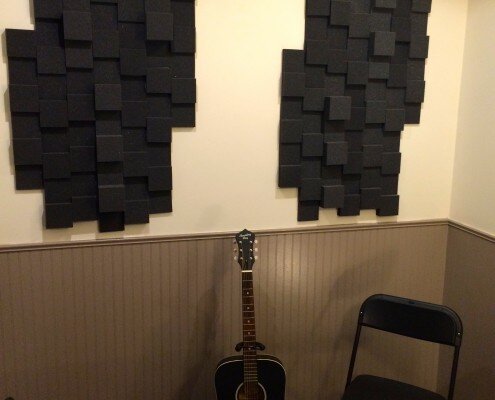New Student Guide
Getting started with lessons is easy. We offer music lessons 6 days a week. Lessons can start anytime and usually, we can get you started the same week that you call. We don’t have any long-term contracts. To register for classes, you can call us at 614-572-3640, email info@powellacademyofmusic.com, or stop by during our office hours.
starting at the right age
Adults can start any instrument at any time. We teach many beginner students in their 60s and 70s.
For children, starting at the right age is a key element to the success of their lessons. Some people will tell you “the sooner the better” but this attitude can actually backfire and be a negative. The following are guidelines that we have found to be successful in determining how young a child can start taking music lessons.
Piano/Keyboard
At our school, 4 years old is the youngest age that we start children in private piano lessons. At this age, they have begun to develop longer attention spans and can retain material with ease. Learn more about Piano Lessons.
Guitar – Acoustic, Electric and Bass
6 years old is the earliest we recommend for guitar lessons. Guitar playing requires a fair amount of pressure on the fingertips from pressing on the strings. Children under 6 generally have small hands and may find playing uncomfortable. Bass guitar students generally are 10 years old and older. Learn more about our Guitar Lessons.
Voice Lessons
9 years old is recommended as the youngest age for private vocal lessons. Due to the physical nature of voice lessons (proper breathing techniques, development of the vocal chords and lung capacity), the younger body is generally not yet ready for the rigors of vocal technique. For students that are younger than 9 years old, we recommend our Children’s Choir. Learn more about our Voice Lessons.
Flute, Clarinet & Saxophone
Due to lung capacity (and in the case of saxophone, the size of the instrument), we recommend that most woodwind beginners are 9 and older. Learn more about our Saxophone Lessons, Clarinet Lessons, & Flute Lessons.
Violin, Viola
We accept violin/viola students from the age of 5. Some teachers will start children as young as 3, but experience has shown us the most productive learning occurs when the beginner is 5 or older. Learn more about our Violin Lessons.
Cello
We recommend that cello students be at least 8 years old due to the size of the instrument. Learn more about our Cello Lessons.
Drums
The average age of our youngest drum students is 8. This varies greatly depending on the size of the child. They have to be able to reach both the pedals and the cymbals on a drum set. Some younger students can begin on a drum pad and advance onto a drum set when they are older. Learn more about our Drum Lessons.
Trumpet
The trumpet requires physical exertion and lung power. 9 years and older is a good time to start the trumpet. Learn more about our Trumpet Lessons.
Use recognized Teaching Methods
There are some excellent materials developed by professional music educators that are made for students in a variety of situations. For example, in piano, there are books for very young beginners and books for adult students that have never played before. There are books that can start you at a level you are comfortable with. These materials have been researched and are continually upgraded and improved to make learning easier. These materials ensure that no important part of learning the instrument can inadvertently be left out.
If you ever have to move to a different part of the country, qualified teachers and institutions will recognize the materials and be able to smoothly continue from where the previous teacher left off.
Take Lessons in a
Professional Environment
Learning music is not just a matter of having a qualified teacher, but also having an environment that is focused on music education. In a professional school environment, a student cannot be distracted by a TV, pets, ringing phones, siblings, or anything else. With only half an hour to one hour of lesson time per week, a professional school environment can produce the best results, since the only focus at that time is learning music.
Benefits of a
Professional Studio
Students in a school environment are also motivated by hearing peers who are at different levels and by being exposed to a variety of instruments. In a music school, the lessons are not just a hobby or side gig for the teacher, but a responsibility which is taken very seriously.
Make Practicing Easier
As with anything, improving in music takes practice. One of the main problems with music lessons is the drudgery of practicing and the fight between parents and students to practice everyday. Here are some ways to make practicing easier:
Time
Set the same time everyday to practice so it becomes part of a routine or habit. This works particularly well for children. Generally, the earlier in the day the practicing can occur, the less reminding is required by parents to get the child to practice.
Repetition
We use this method quite often when setting practice schedules for beginners. For a young child ,20 or 30 minutes seems like an eternity. Instead of setting a time frame, we use repetition. For example, practice this piece 4 times everyday and this scale 5 times a day. The child then does not pay attention to the amount of time they are practicing their instrument, but knows if they are on repetition number 3, they are almost finished.
Rewards
This works very well for both children and adult students. Some adults reward themselves with a cappuccino after a successful week of practicing. Parents can encourage children to practice by granting them occasional rewards for successful practicing.
At the Academy, we have our 100 Minute Practice Club where students get tokens for practicing that they can trade in for small prizes and toys. We also have our Level Up Motivational Program which gives students specific goals to work towards.
Most Importantly…Have Fun!
Music should be something that you enjoy for a lifetime. So try not to put unrealistic expectations on yourself or your children to learn too quickly. Everyone learns at a different pace and the key is to be able to enjoy the journey.










